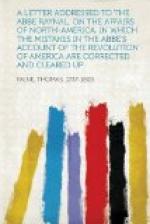OF THE
REVOLUTION of AMREICA [sic]
Are corrected and cleared up.
* * * * *
By Thomas Paine,
Secretary for foreign affairs
to Congress, during the American
war,
and author of common sense,
and the rights of man.
* * * * *
LONDON:
Printed for J. Ridgeway, no. 1, York-street, st. JAMES’S Square.
M,DCC,XII. [sic, actually 1792]
INTRODUCTION.
A London translation of an original work in French, by the Abbe Raynal, which treats of the Revolution of North America, having been reprinted in Philadelphia and other parts of the continent, and as the distance at which the Abbe is placed from the American theatre of war and politics, has occasioned him to mistake several facts, or misconceive the causes or principles by which they were produced; the following tract, therefore, is published with a view to rectify them, and prevent even accidental errors intermixing with history, under the sanction of time and silence.
The Editor of the London edition has entitled it, “The Revolution of America, by the Abbe Raynal,” and the American printers have followed the example. But I have understood, and I believe my information just, that the piece, which is more properly reflections on the revolution, was unfairly purloined from the printer which the Abbe employed, or from the manuscript copy, and is only part of a larger work then in the press, or preparing for it. The person who procured it appears to have been an Englishman; and though, in an advertisement prefixt to the London edition, he has endeavoured to gloss over the embezzlement with professions of patriotism, and to soften it with high encomiums on the author, yet the action, in any view in which it can be placed, is illiberal and unpardonable.
“In the course of his travels,” says he, “the translator happily succeeded in obtaining a copy of this exquisite little piece, which has not yet made its appearance from any press. He publishes a French edition, in favour of those who will feel its eloquent reasoning more forcibly in its native language, at the same time with the following translation of it; in which he has been desirous, perhaps in vain, that all the warmth, the grace, the strength, the dignity of the original should not be lost. And he flatters himself, that the indulgence of the illustrious historian will not be wanting to a man, who, of his own motion, has taken the liberty to give this composition to the public, only from a strong persuasion, that this momentous argument will be useful, in a critical conjecture, to that country which he loves with an ardour that can be exceeded only by the nobler flame which burns in the bosom of the philanthropic author, for the freedom and happiness of all the countries upon earth.”




